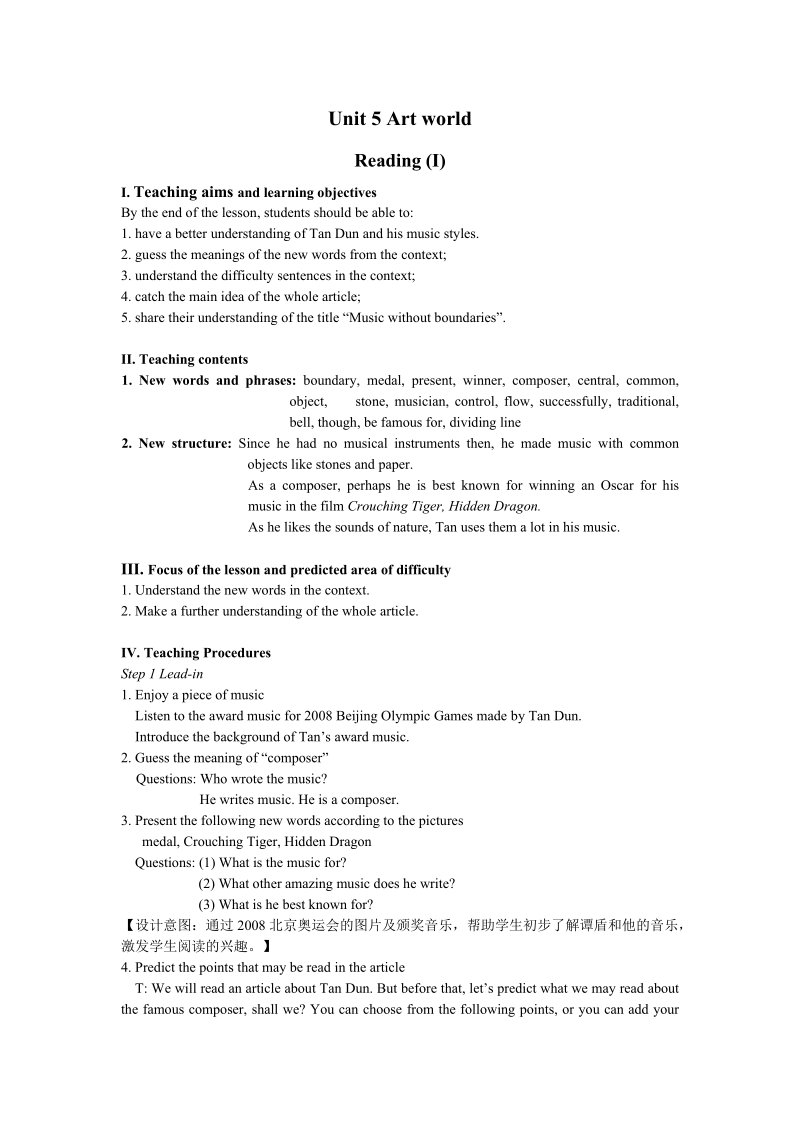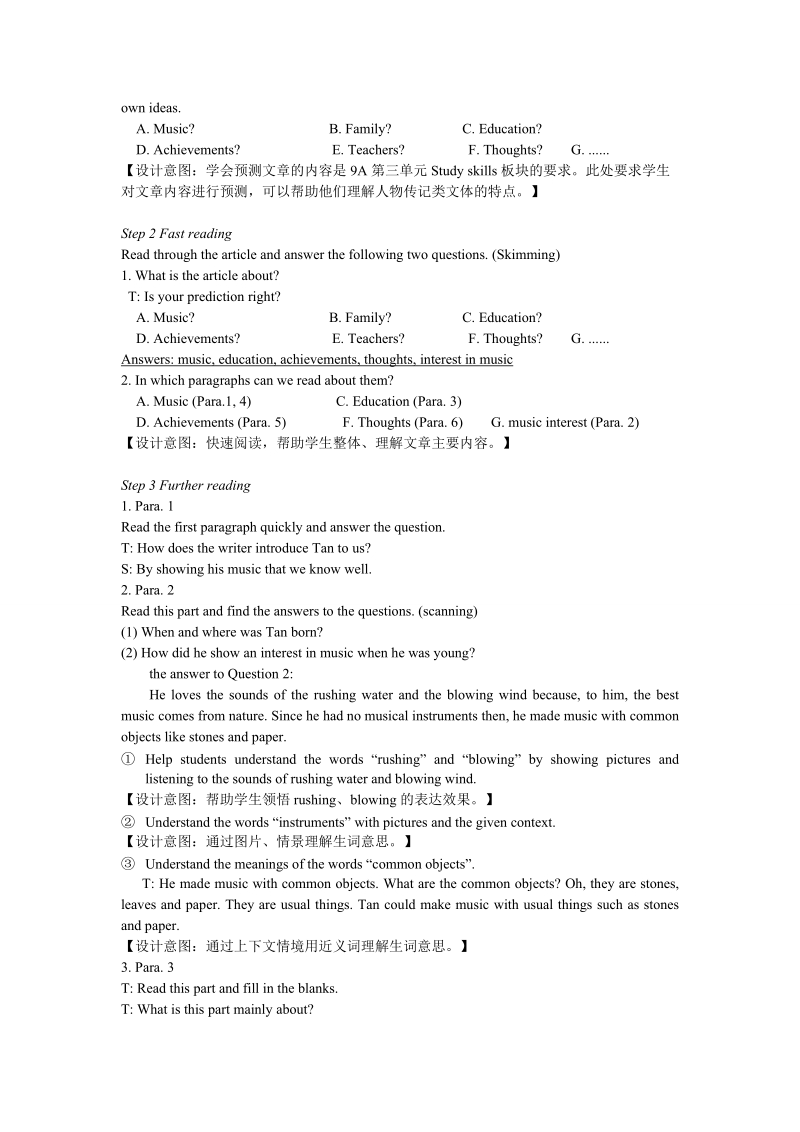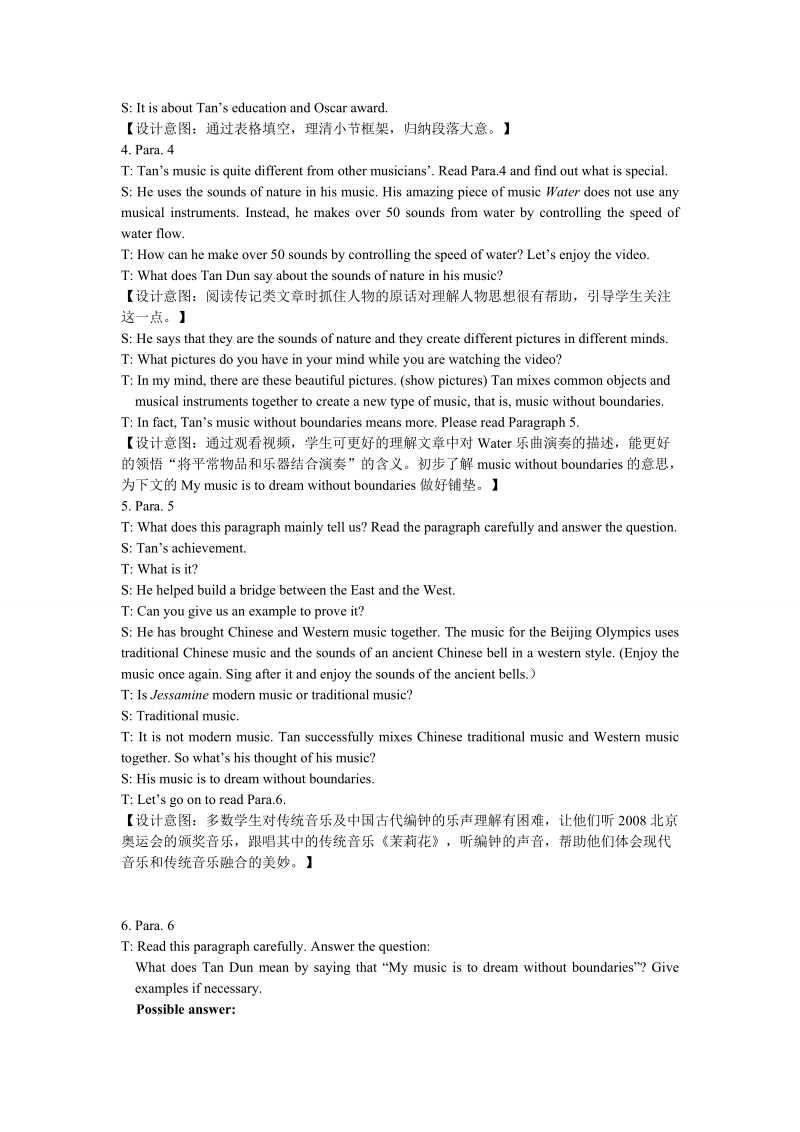 牛津译林版九年级上英语Unit5 Reading (I) 教案
牛津译林版九年级上英语Unit5 Reading (I) 教案
《牛津译林版九年级上英语Unit5 Reading (I) 教案》由会员分享,可在线阅读,更多相关《牛津译林版九年级上英语Unit5 Reading (I) 教案(4页珍藏版)》请在七七文库上搜索。
1、Unit 5 Art worldReading (I)I. Teaching aims and learning objectivesBy the end of the lesson, students should be able to:1. have a better understanding of Tan Dun and his music styles.2. guess the meanings of the new words from the context;3. understand the difficulty sentences in the context;4. catc
2、h the main idea of the whole article;5. share their understanding of the title “Music without boundaries”. II. Teaching contents1. New words and phrases: boundary, medal, present, winner, composer, central, common, object, stone, musician, control, flow, successfully, traditional, bell, though, be f
3、amous for, dividing line2. New structure: Since he had no musical instruments then, he made music with common objects like stones and paper.As a composer, perhaps he is best known for winning an Oscar for his music in the film Crouching Tiger, Hidden Dragon.As he likes the sounds of nature, Tan uses
4、 them a lot in his music. III. Focus of the lesson and predicted area of difficulty1. Understand the new words in the context. 2. Make a further understanding of the whole article. IV. Teaching ProceduresStep 1 Lead-in1. Enjoy a piece of musicListen to the award music for 2008 Beijing Olympic Games
5、made by Tan Dun. Introduce the background of Tans award music. 2. Guess the meaning of “composer” Questions: Who wrote the music? He writes music. He is a composer. 3. Present the following new words according to the pictures medal, Crouching Tiger, Hidden Dragon Questions: (1) What is the music for
6、? (2) What other amazing music does he write? (3) What is he best known for? 【设计意图:通过 2008 北京奥运会的图片及颁奖音乐,帮助学生初步了解谭盾和他的音乐,激发学生阅读的兴趣。】4. Predict the points that may be read in the article T: We will read an article about Tan Dun. But before that, lets predict what we may read about the famous composer
7、, shall we? You can choose from the following points, or you can add your own ideas. A. Music? B. Family? C. Education?D. Achievements? E. Teachers? F. Thoughts? G. 【设计意图:学会预测文章的内容是 9A 第三单元 Study skills 板块的要求。此处要求学生对文章内容进行预测,可以帮助他们理解人物传记类文体的特点。】Step 2 Fast readingRead through the article and answer
8、the following two questions. (Skimming) 1. What is the article about? T: Is your prediction right? A. Music? B. Family? C. Education?D. Achievements? E. Teachers? F. Thoughts? G. Answers: music, education, achievements, thoughts, interest in music2. In which paragraphs can we read about them? A. Mus
9、ic (Para.1, 4) C. Education (Para. 3) D. Achievements (Para. 5) F. Thoughts (Para. 6) G. music interest (Para. 2) 【设计意图:快速阅读,帮助学生整体、理解文章主要内容。】Step 3 Further reading1. Para. 1Read the first paragraph quickly and answer the question. T: How does the writer introduce Tan to us? S: By showing his music
10、that we know well. 2. Para. 2 Read this part and find the answers to the questions. (scanning) (1) When and where was Tan born? (2) How did he show an interest in music when he was young?the answer to Question 2: He loves the sounds of the rushing water and the blowing wind because, to him, the best
11、 music comes from nature. Since he had no musical instruments then, he made music with common objects like stones and paper. Help students understand the words “rushing” and “blowing” by showing pictures and listening to the sounds of rushing water and blowing wind. 【设计意图:帮助学生领悟 rushing、blowing 的表达效



- 配套讲稿:
如PPT文件的首页显示word图标,表示该PPT已包含配套word讲稿。双击word图标可打开word文档。
- 特殊限制:
部分文档作品中含有的国旗、国徽等图片,仅作为作品整体效果示例展示,禁止商用。设计者仅对作品中独创性部分享有著作权。
- 关 键 词:
- 牛津 译林版 九年级 英语 Unit5Reading 教案
 七七文库所有资源均是用户自行上传分享,仅供网友学习交流,未经上传用户书面授权,请勿作他用。
七七文库所有资源均是用户自行上传分享,仅供网友学习交流,未经上传用户书面授权,请勿作他用。
文档标签
- 牛津译林版九年级上英语Unit6 Reading I 教案
- 牛津译林版九年级上英语Unit8 Reading I 教案
- 牛津译林版九年级上英语Unit5单元复习学案
- 牛津译林版九年级上英语Unit3 Reading I 教案
- 牛津译林版九年级下英语Unit2 Reading I 教案
- 牛津译林版九年级上英语Unit8 Reading I课件素材
- 牛津译林版九年级上英语Unit5 Grammar 教案
- 牛津译林版九年级上英语Unit2 Reading I 教案
- 牛津译林版九年级上英语Unit7 Reading I 教案
- 牛津译林版九年级下英语Unit1 Reading I 教案
- 牛津译林版八年级上英语Unit5 Reading I 教案
- 牛津译林版九年级上英语Unit5 Task 教案
- 牛津译林版英语4B Unit5教案
- 牛津译林版九年级上英语Unit5 Reading I 教案
- 牛津译林版九年级上英语Unit7 Reading I课件素材
- 牛津译林版九年级上英语Unit1 Reading I 教案
- 牛津译林版九年级上英语Unit4 Reading I 教案
- 牛津译林版七年级下英语Unit5 Reading I 教案
- 牛津译林版八年级下英语Unit5 Reading I 教案
- 牛津译林版七年级上英语Unit5 Reading I 教案



 浙公网安备33030202001339号
浙公网安备33030202001339号
链接地址:https://www.77wenku.com/p-86781.html